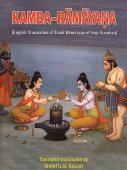Mahodara, Maha-udara, Mahodāra, Mahant-odara: 25 definitions
Introduction:
Mahodara means something in Buddhism, Pali, Hinduism, Sanskrit, Jainism, Prakrit. If you want to know the exact meaning, history, etymology or English translation of this term then check out the descriptions on this page. Add your comment or reference to a book if you want to contribute to this summary article.
Mahodara has 23 English definitions available.
Languages of India and abroad
Sanskrit dictionary
[Deutsch Wörterbuch]
Source: Cologne Digital Sanskrit Dictionaries: Böhtlingk and Roth Grosses Petersburger WörterbuchMahodara (महोदर):—1. (mahā + u) n. ein starker Leib, Wasserbauch, Bauchwassersucht: jāta [Bhāgavatapurāṇa 9, 7, 16.]
--- OR ---
Mahodara (महोदर):—2. (wie eben)
1) adj. f. ī dickbäuchig [Rāmāyaṇa 3, 23, 15.] vyāghra [PAÑCAR. 1, 3, 68.] —
2) m. Nomen proprium a) eines Schlangendämons [Mahābhārata 1, 1561.] — b) eines Dānava [Mahābhārata 1, 2533.] harāhara ed. Bomb. — c) eines Rākṣasa [Rāmāyaṇa 5, 45, 10. 80, 1. 6, 12, 17. 35, 11.] — d) eines Sohnes des Dhṛtarāṣṭra [Mahābhārata 1, 2732. 4546. 6, 3901. 3903.] — e) eines Sohnes des Viśvāmitra [Rāmāyaṇa Gorresio 1, 58, 5.] mahāratha [SCHL.] —
3) f. ī Asparagus racemosus Willd. [Rājanirghaṇṭa im Śabdakalpadruma]
--- OR ---
Mahodara (महोदर):—1. [Rāmāyaṇa 7, 35, 54.]
--- OR ---
Mahodara (महोदर):—2.
2) f) eines Brahmanen [Mahābhārata 9, 2257. 2266.]
Source: Cologne Digital Sanskrit Dictionaries: Sanskrit-Wörterbuch in kürzerer FassungMahodara (महोदर):—1. n. Wasserbauch , Bauchwassersucht [Indische studien von Weber 14,375.]
--- OR ---
Mahodara (महोदर):—2. —
1) Adj. (f. ī) dickbäuchig [Carakasaṃhitā 1,27] ([Carakasaṃhitā .ed.Calc.S.196.]). —
2) m. Nomen proprium — a) eines Schlangendämons. — b) eines Dānava. — c) eines Rākṣasa. — d) verschiedener Männer. —
3) f. ī — a) *Asparagus racemosus [Bhāvaprakāśa 1,212.] — b) Nomen proprium einer Tochter Maya’s [Wilson's Uebersetzung des Viṣṇupurāṇa 2,72.]
Sanskrit, also spelled संस्कृतम् (saṃskṛtam), is an ancient language of India commonly seen as the grandmother of the Indo-European language family (even English!). Closely allied with Prakrit and Pali, Sanskrit is more exhaustive in both grammar and terms and has the most extensive collection of literature in the world, greatly surpassing its sister-languages Greek and Latin.
See also (Relevant definitions)
Partial matches: Mahant, Odara, Maha, Udara.
Starts with: Mahodaramukha.
Full-text (+22): Mahodaramukha, Tubh, Mahodarya, Mahodareshvara, Pushpotkata, Tiracchika, Mahoara, Makotaran, Culodara, Dhumasikha, Maniakkhi, Mahodari, Kannavadhamana, Surupanayana, Tadinmala, Sumukha, Agnijihva, Vidyadhipa, Visheshvara, Prahasta.
Relevant text
Search found 31 books and stories containing Mahodara, Maha-udara, Mahodāra, Mahant-odara, Mahā-udara, Mahā-udāra, Mahōdara; (plurals include: Mahodaras, udaras, Mahodāras, odaras, udāras, Mahōdaras). You can also click to the full overview containing English textual excerpts. Below are direct links for the most relevant articles:
Chaitanya Bhagavata (by Bhumipati Dāsa)
Verse 2.10.267 < [Chapter 10 - Conclusion of the Lord’s Mahā-prakāśa Pastimes]
Ramayana of Valmiki (by Hari Prasad Shastri)
Chapter 98 - Mahodara is slain by Sugriva < [Book 6 - Yuddha-kanda]
Chapter 70 - The Death of Devantaka, Trishiras, Mahodara and Mahaparshva < [Book 6 - Yuddha-kanda]
Chapter 23 - Ravana’s Struggle with the Sons of Varuna < [Book 7 - Uttara-kanda]
Mahabharata (English) (by Kisari Mohan Ganguli)
The Agni Purana (by N. Gangadharan)
Chapter 71 - Mode of worshipping Gaṇeśa (gaṇeśapūjā)
Chapter 10 - Manifestation of Viṣṇu as Rāma (part 6)
Chapter 313 - The mantras relating to the worship of different gods
Trishashti Shalaka Purusha Caritra (by Helen M. Johnson)
Part 3: Marriages of Kumbhakarṇa and Bibhīṣaṇa < [Chapter II - Rāvaṇa’s expedition of Conquest]
Part 3: War between the Rākṣasas and Vānaras < [Chapter VII - The killing of Rāvaṇa]
The Great Chronicle of Buddhas (by Ven. Mingun Sayadaw)
Part 4 - Buddha’s Visits to Sihala (Sri Lanka) and Nagadipa < [Chapter 26 - The Buddha’s Eighth Vassa at the Town of Susumaragira]
Buddha attributes (6): Anuttaropurisa damma sārathi < [Chapter 42 - The Dhamma Ratanā]
Part 4 - Kāḷa Buddha Rakkhita Thera < [Chapter 23 - The Buddha’s Fifth Vassa at Vesali]
Related products
